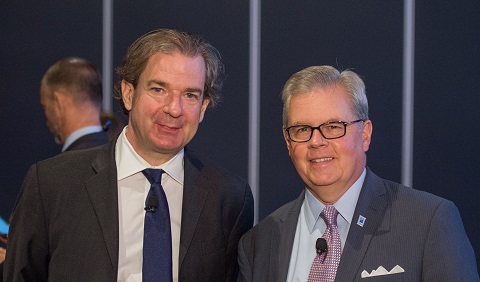![]() Print this Article | Send to Colleague
Print this Article | Send to Colleague

Keynote Address with Peter Bergen
On 9/11, there were only 16 people on the No-Fly List, said CNN’s National Security Analyst Peter Bergen. Now, there are thousands on this list. Those numbers speak volumes about how serious the terrorist threat danger is at airports and how seriously the United States federal government's Terrorist Screening Center (TSC) is addressing the threat.
Bergen, who has been part of this security discussion for more than two decades, shared his perspective on this topic during the keynote presentation on Tuesday. "Aviation security is the top national security issue," he said. "They remain the Holy Grail and that is not to change any time soon. They are going to find the weakest links in the systems and are going to try to attack them."
And there isn’t much you can do to discourage them trying to target you. "They are not going to target bus stations in the same way," he explained. "You can push back the perimeter, but you are just pushing back the problem." He mentioned an interesting idea he saw in Turkey, where your entire car has to go through an X-ray-type machine. But, then is this long of cars creating another target, similar to the long queue lines at gate security checkpoints?
The main security issue facing airports now is the insider threat, he said, as we saw with the Metrojet attack in Egypt last year -- the deadliest attack on aviation since 9/11. Also, not just airline or airport personnel are involved. As a recent example, he mentioned an incident at Heathrow where someone in the shopping area was in contact with a terrorist group. "The problem is people who are being radicalized and being radicalized very quickly," said Bergen. "Internet is radicalizing people and there is not a lot you can do except put better media out there."
The other problem is that if we destroyed ISIS tomorrow, "that would not be solving the problem. ISIS is the symptom of a deeper problem that is not going away anytime soon." He explained that ISIS has lost 45,000 fighters in the past two years and are no longer able to replenish themselves. But, before long, "there will be a son of ISIS or sons of ISIS."
Also, what happens as ISIS is increasingly put under pressure and defeated? What happens to the foreign fighters? They will disperse and have nowhere to go, said Bergen. "What kind of threat do they pose?"
Terrorists are also acquiring armed drones and are becoming their own media network. "ISIS is broadcasting attacks in real time," said Bergen. "It is a sobering development.’
On a good note, however, "the fact is, the U.S. government has done a good job of keeping us safe, as have the people in this room," said Bergen. Will there be more attacks? Yes. But, we have made it "much, much harder for terrorists to attack the United States," said Bergen.

